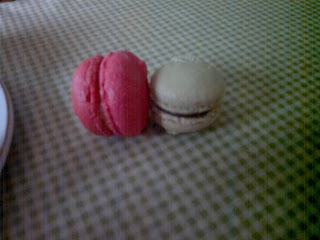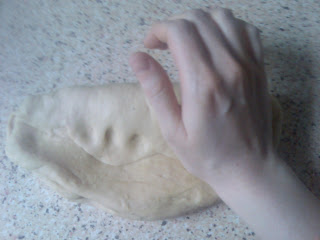Sorry no Pictures (lost them with my phone!)
Stage 1: Buttercream
60g water (approx or enough just to cover the sugar)
140g caster sugar
2 egg yolks
190g unsalted butter, at room temperature
extract of choice
Stage 2: Italian Meringue
2 whites (60g)
120g caster sugar
50g water (approx or enough just to cover the sugar)
Stage 1: Buttercream
put the caster sugar in a small pot with the water. Stir and brush down the sides with a clean finger or clean pastry brush to remove any sugar from the sides of the pan (any sugar on the side will crystallise during the cooking and can cause the rest of the sugar to crystallise)
Put over a medium high heat. Monitor with a thermometer (when taking the temperature, take in the centre of the mixture and ensure the tip is not touching the pot's base (the metal of the base will be hotter than the sugar mix so you'll get a higher and inaccurate reading)
Meanwhile, whisk the yolks until thick.
When the sugar mixture reaches 121C remove from heat and allow the bubbles to subside off the heat
Once the bubbles have subsided (almost immediately for this small recipe but may take a few minutes for larger quantities of sugar), pour the sugar down the
side of the bowl containing the egg yolks while whisking the yolks on medium speed. It is vital that you do not let the sugar to hit the whisk on its way down- this will just spin the sugar around the bowl and not into the yolks-and you'll end up with a runny mixture with hard sugar pieces in it).
Continue whisking until the mixture has cooled completely. There will be a sugar trail on the side of the bowl-don't scrape this into the mixture or you'll have hard pieces in the mix, just leave it.
On medium speed start to incorporate the butter, continue to add the butter slowly until all has been incorporated. Add any extract or colour of choice.
You can use the buttercream as is or you can incorporate Italian meringue (stage 2 of the recipe) for a lighter buttercream.
Stage 2:
Italian meringue
the basic rule of thumb is double the sugar to your whites for meringue. So weigh the whites you had left over from the buttercream and multiply by two to get the amount of sugar you should use, if using large eggs, you will probably have 60g or so of whites.
put the caster sugar in a small pot with the water. Stir and brush down the sides with a clean finger or
clean pastry brush to remove any sugar from the sides of the pan (any sugar on the side will crystallise during the cooking and can cause the rest of the sugar to crystallise). Continue to do this during the cooking process as necessary.
Put over a medium high heat. Monitor with a thermometer (again when taking the temperature, take in the centre of the mixture and ensure the tip is not touching the pot's base (the metal of the base will be hotter than the sugar mix so you'll get a higher and inaccurate reading)
When the temperature measures about 105C start whisking the whites to firm.
When the sugar mixture reaches 121C remove from heat and allow the bubbles to subside off the heat
Once the bubbles have subsided (almost immediately for this small recipe but may take a few minutes for larger quantities of sugar), pour the sugar down the
side of the bowl containing the whites while whisking on medium speed. Again, it is vital that you do not let the sugar to hit the whisk on its way down- this will just spin the sugar around the bowl and not into the whites-and you'll end up with a runny mixture with hard sugar pieces in it).
Continue whisking on medium speed until the mixture has cooled completely. You must let it cool completely before you finish whisking or the meringue will break down. There will be a sugar trail on the side of the bowl-don't scrape this into the mixture or you'll have hard pieces in the mix, just leave it.
Fold all or some of the Italian meringue into the buttercream. Colour if desired.





















































